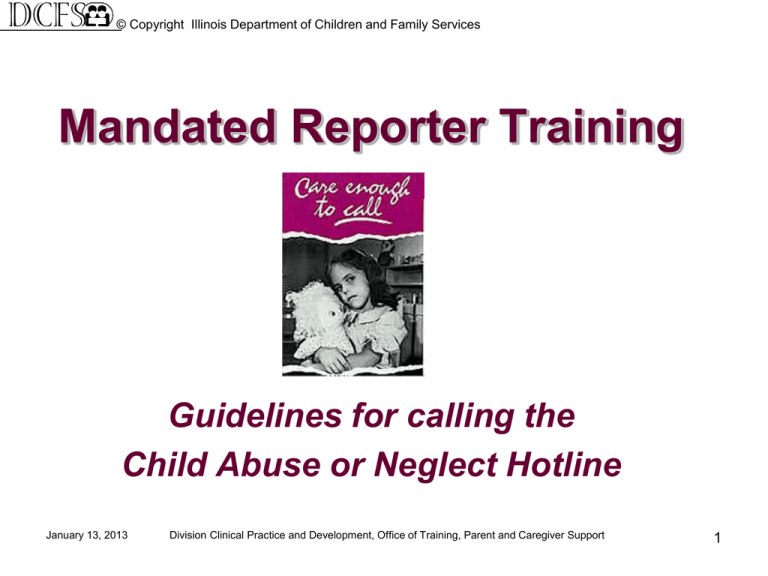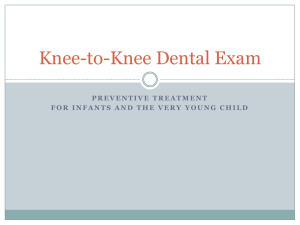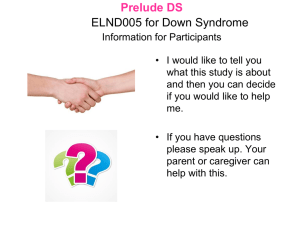
© Copyright Illinois Department of Children and Family Services
Mandated Reporter Training
Guidelines for calling the
Child Abuse or Neglect Hotline
January 13, 2013
Division Clinical Practice and Development, Office of Training, Parent and Caregiver Support
1
© Copyright Illinois Department of Children and Family Services
What you will learn:
When you have completed this training you will :
• Better recognize the signs of child abuse and neglect
• Define the types of child abuse and neglect
• Determine what professions/individuals are mandated to
report
• Know your role as a Mandated Reporter
• Understand your legal obligations as a Mandated
Reporter
• Know How to Access On-Line Training Resources
January 13, 2013
Division Clinical Practice and Development, Office of Training, Parent and Caregiver Support
2
© Copyright Illinois Department of Children and Family Services
What you will learn (Cont’d):
When you have completed this training you will
be able to:
• Know when and how to report abuse and/or
neglect to the Hotline
• Identify the steps and tools to use when making
a child abuse report
• Identify which groups of children may be at a
higher risk of being abused or neglected
• Understand the process that occurs after a
hotline call is made
January 13, 2013
Division Clinical Practice and Development, Office of Training, Parent and Caregiver Support
3
© Copyright Illinois Department of Children and Family Services
What is Mandated Reporting?
January 13, 2013
Division Clinical Practice and Development, Office of Training, Parent and Caregiver Support
4
© Copyright Illinois Department of Children and Family Services
What is My Role as a Mandated Reporter?
• Your Role: As a person
who works with children,
it is your legal obligation
to report your suspicions
to DCFS. It is not your
role to investigate what
the child has told you.
January 13, 2013
• DCFS's Role: It is the
obligation of DCFS to
provide a Child Abuse
Hotline to screen reports
and to investigate your
report to determine
whether the child has
been abused or
neglected and, if so, how
to ensure that the child is
protected
Division Clinical Practice and Development, Office of Training, Parent and Caregiver Support
5
© Copyright Illinois Department of Children and Family Services
Who is a Mandated Reporter?
1-800-25-ABUSE
1-800-252-2873
TTY 1-800-358-5117
January 13, 2013
Division Clinical Practice and Development, Office of Training, Parent and Caregiver Support
6
© Copyright Illinois Department of Children and Family Services
Why Is Mandated Reporting Important?
• Possibly as high as 60% of child abuse and
neglect is never reported
• Illinois accepts around 70,000 reports per year,
impacting more that 100,000 children
• Early detection and intervention may prevent
further abuse, neglect and possibly DEATH
• If Mandated Reporters don’t recognize the signs
of child abuse and neglect, and report their
suspicions to the hotline, intervention and
treatment may not be possible.
January 13, 2013
Division Clinical Practice and Development, Office of Training, Parent and Caregiver Support
7
© Copyright Illinois Department of Children and Family Services
Criteria for Taking a Report
of Suspected Child Abuse or Neglect
Criteria for Taking a Report of Suspected
Child Abuse or Neglect:
• Alleged Victim
• Alleged Perpetrator
• Specific Incident
• Harm or Substantial Risk of Physical or
Sexual Injury
January 13, 2013
Division Clinical Practice and Development, Office of Training, Parent and Caregiver Support
8
© Copyright Illinois Department of Children and Family Services
Mandated Reporter Tip
• While an "alleged perpetrator" is the person who
either directly causes or allows child abuse or
neglect to occur, there are different definitions.
• For DCFS purposes, this includes any individual
residing in the child's home, any person responsible
for the child's welfare, or anyone who came to know
the child through a position of trust, such as mother,
father, teacher, counselor, or coach to name a few. If
the perpetrator does not fit within one of the above
categories, the incident may be a crime but it is not
classified as "child abuse."
• For criminal matters a perpetrator could be anybody.
January 13, 2013
Division Clinical Practice and Development, Office of Training, Parent and Caregiver Support
9
© Copyright Illinois Department of Children and Family Services
Recognizing types of
Child Abuse and Neglect
Three main types of abuse and neglect
• Physical Abuse
– Inflicts or allows a physical injury
– Creates or allows a substantial risk of
physical harm to a child
– Violates a court order that prohibits the
perpetrator from having access to the child
– Deliberately inflicts or allows cruel or
unusual treatment which results in physical
or mental suffering by the child;
January 13, 2013
Division Clinical Practice and Development, Office of Training, Parent and Caregiver Support
10
© Copyright Illinois Department of Children and Family Services
Recognizing types of
Child Abuse and Neglect
Three main types of abuse and neglect
• Physical Abuse (Cont’d)
– Inflicts or allows excessive corporal
punishment
– Gives or allows a controlled substance to be
given to a child under 18 years of age
– Exposes the child to the manufacture of
methamphetamine
January 13, 2013
Division Clinical Practice and Development, Office of Training, Parent and Caregiver Support
11
© Copyright Illinois Department of Children and Family Services
Possible Signs of Physical Abuse
• Unexplained marks on the body
• Bruises or welts in various stages of
healing or in clusters or patterns in the
shape of an object
• Pattern burns
• Marks hidden from typically exposed skin
• Behavioral changes
January 13, 2013
Division Clinical Practice and Development, Office of Training, Parent and Caregiver Support
12
© Copyright Illinois Department of Children and Family Services
Recognizing Sign and Symptoms of Child Sexual Abuse
• Types of Sexual Abuse
– Sexual Penetration
– Sexual Molestation
– Sexual Exploitation
• Possible Signs of Sexual Abuse
–
–
–
–
–
–
–
Sexual knowledge beyond what is age appropriate
Recurring pain or itching in genital or anal area
Sexually transmitted diseases
Frequent bladder of urinary tract infections
Genital injury
Unexplained regression or fear
Sexually acting out behavior
January 13, 2013
Division Clinical Practice and Development, Office of Training, Parent and Caregiver Support
13
© Copyright Illinois Department of Children and Family Services
Recognizing Types of Child Neglect
• Types of Neglect
– Adequate supervision
– Medical care/attention
– Food
– Clothing
– Shelter
January 13, 2013
Division Clinical Practice and Development, Office of Training, Parent and Caregiver Support
14
© Copyright Illinois Department of Children and Family Services
Recognizing Signs of Child Neglect
• Signs of Neglect
– Often hungry in the morning
– Poor hygiene
– Evidence of no or poor supervision
– Underweight, poor growth, failure to thrive
– Dressed inappropriately for the weather
– Erratic attendance at school
January 13, 2013
Division Clinical Practice and Development, Office of Training, Parent and Caregiver Support
15
© Copyright Illinois Department of Children and Family Services
Reporting Psychological Abuse
• May only be reported by licensed medical
and mental health professionals, including:
– Registered Psychologists
– Medical Doctors
– Registered Nurses
– Certified Social Worker
– School Teachers
– Therapists and Counselors employed in a
community health agency or social service
agency
January 13, 2013
Division Clinical Practice and Development, Office of Training, Parent and Caregiver Support
16
© Copyright Illinois Department of Children and Family Services
What children are at risk of Child Abuse or Neglect?
January 13, 2013
Division Clinical Practice and Development, Office of Training, Parent and Caregiver Support
17
© Copyright Illinois Department of Children and Family Services
High Risk Children Include
Preschool Children
• Vulnerabilities
– May not know the
words to describe
what happened
– Dependent for all
their needs
– Often isolated
January 13, 2013
Division Clinical Practice and Development, Office of Training, Parent and Caregiver Support
18
© Copyright Illinois Department of Children and Family Services
Myth Buster!
• There is a popular belief that preschool
children are inherently unreliable sources
of information. Child sexual abusers know
this myth and exploit it to their advantage.
Research has shown that if questioned
properly, even very young children are
reliable sources of information.
January 13, 2013
Division Clinical Practice and Development, Office of Training, Parent and Caregiver Support
19
© Copyright Illinois Department of Children and Family Services
Higher Risk Children:
Children with Disabilities
• Vulnerabilities
– Family stress
– Isolation
– Dependency on
caretakers
– Difficulty with
communication
January 13, 2013
Division Clinical Practice and Development, Office of Training, Parent and Caregiver Support
20
© Copyright Illinois Department of Children and Family Services
Myth Buster!
• As with preschoolers, there is a myth that
children with certain disabilities are
unreliable. Even if a child cannot talk or
only expresses herself with difficulty, this
should not prevent you from making a
report if you suspect child abuse. DCFS
investigators have several techniques they
can use to communicate with non-verbal
children.
January 13, 2013
Division Clinical Practice and Development, Office of Training, Parent and Caregiver Support
21
© Copyright Illinois Department of Children and Family Services
High Risk Children:
GLBTQ Children
• Vulnerabilities
– Less social
supports
– Less opportunity
for discussion
– Higher risk of
isolation,
discrimination, and
punishment
January 13, 2013
Division Clinical Practice and Development, Office of Training, Parent and Caregiver Support
22
© Copyright Illinois Department of Children and Family Services
Myth Buster!
• Although some sexual abuse victims are
gay, some people have the mistaken belief
that boys who were sexually abused by
men always become homosexuals. This is
simply not true! This myth only makes it
more difficult for boys to disclose their
sexual abuse histories.
January 13, 2013
Division Clinical Practice and Development, Office of Training, Parent and Caregiver Support
23
© Copyright Illinois Department of Children and Family Services
What Is Not
Child Abuse and Neglect?
• Children who are curious
about their own bodies
• Preschool children who
giggle while touching
their bodies in an
exploratory manner
• Children of the same age
and developmental stage
who are curious about
and explore each other's
bodies
January 13, 2013
Division Clinical Practice and Development, Office of Training, Parent and Caregiver Support
24
© Copyright Illinois Department of Children and Family Services
What Is Not
Child Abuse and Neglect
• Spanking that is not
"excessive corporal
punishment“
• Dirty home that is not
hazardous
• Older child home alone
• Child left with relative
who often cared for the
child
• Abandoned newborn
Infant left at a Safe
Haven
January 13, 2013
(325 ILCS 2/)
Abandoned Newborn
Infant Protection Act
Division Clinical Practice and Development, Office of Training, Parent and Caregiver Support
25
© Copyright Illinois Department of Children and Family Services
Test Your Knowledge #1
Possible signs of physical abuse include:
a)
b)
c)
d)
January 13, 2013
Unexplained marks on the body
Bruises or welts in various stages of healing
Burns that are in patterns
All of the above
Division Clinical Practice and Development, Office of Training, Parent and Caregiver Support
26
© Copyright Illinois Department of Children and Family Services
Test Your Knowledge #2
Neglect occurs when a parent or caretaker
fails to provide:
a) Adequate supervision, medical care, food,
clothing and or shelter
b) Schooling, school supplies, appropriate
school clothing
c) Up to date immunizations
d) All of the above
January 13, 2013
Division Clinical Practice and Development, Office of Training, Parent and Caregiver Support
27
© Copyright Illinois Department of Children and Family Services
Test Your Knowledge # 3
Which of the following is NOT a sign of
sexual abuse:
a) Sexual knowledge beyond what is age
appropriate
b) Recurring pain and itching in the genitals
c) Wearing or sleeping with multiple layers of
clothing
d) Children being curious about their bodies
January 13, 2013
Division Clinical Practice and Development, Office of Training, Parent and Caregiver Support
28
© Copyright Illinois Department of Children and Family Services
Reporter Tip!
• When in doubt, MAKE A CHILD ABUSE
REPORT and let DCFS do its job by
investigating!
January 13, 2013
Division Clinical Practice and Development, Office of Training, Parent and Caregiver Support
29
© Copyright Illinois Department of Children and Family Services
Dealing with the Child’s Disclosure
of Suspected Child Abuse/Neglect
• Best indicator is
child’s spontaneous
report
• Disclosure can be
stressful to child and
YOU
• Impacts child’s
safety and journey
to recovery
January 13, 2013
Division Clinical Practice and Development, Office of Training, Parent and Caregiver Support
30
© Copyright Illinois Department of Children and Family Services
Dealing with the Child’s Disclosure
of Suspected Child Abuse/Neglect
• Body language
• Facial expressions
• Never put words in a
child’s mouth
• Limit your questioning
– Can be traumatic
– May negatively impact the
DCFS investigation and
the criminal investigation.
January 13, 2013
Division Clinical Practice and Development, Office of Training, Parent and Caregiver Support
31
© Copyright Illinois Department of Children and Family Services
Reporter Tip!
Extensive interviews of a child about an
abuse incident can traumatize the child
and have a negative impact on the
investigation, if not done appropriately.
After the report is made, a trained
professional interviewer will conduct an
interview of the child. Multiple interviews of
a child can be traumatizing and should be
avoided at all costs.
January 13, 2013
Division Clinical Practice and Development, Office of Training, Parent and Caregiver Support
32
© Copyright Illinois Department of Children and Family Services
Myth Busters
Sometimes when children make a disclosure of
abuse or neglect, they later say nothing
happened. This does not always mean that the
child was not initially telling the truth. Sometimes
recanting is a natural reaction for children
because there may be factors influencing the
child to change their story. For example, being
frightened, parent pressure, or perpetrator
threats may cause the child to change their
story.
January 13, 2013
Division Clinical Practice and Development, Office of Training, Parent and Caregiver Support
33
© Copyright Illinois Department of Children and Family Services
Calling the Hotline
January 13, 2013
Division Clinical Practice and Development, Office of Training, Parent and Caregiver Support
34
January 13, 2013
Division Clinical Practice and Development, Office of Training, Parent and Caregiver Support
35
January 13, 2013
Division Clinical Practice and Development, Office of Training, Parent and Caregiver Support
36
Calling the Hotline, Continued
January 13, 2013
Division Clinical Practice and Development, Office of Training, Parent and Caregiver Support
37
© Copyright Illinois Department of Children and Family Services
Reporter Tip!
As a Mandated Reporter, you have specific rights :
• To the Hotline worker’s full name
• To speak to the Hotline worker’s supervisor if you do
not agree with the Hotline worker’s decision
• To request a review of an investigation that has been
unfounded if there are concerns regarding the
adequacy of the investigation
• To receive information about the findings and
actions taken by the Department during the
investigation, including actions taken to ensure a
child’s safety
January 13, 2013
Division Clinical Practice and Development, Office of Training, Parent and Caregiver Support
38
© Copyright Illinois Department of Children and Family Services
Myth Busters
Many Mandated Reporters believe that
when they make a child abuse or neglect
report the child will be removed from their
family. In fact, less than 5% of children
reported for abuse or neglect are removed
from the home and usually it is not long
term. For those who are not removed,
their families are provided with services to
insure the safety of the child.
January 13, 2013
Division Clinical Practice and Development, Office of Training, Parent and Caregiver Support
39
© Copyright Illinois Department of Children and Family Services
Frequently Asked Questions
1. If I call the Hotline, are you sure the
family will not be told my name?
2. What if the family can tell I made the
report? Who is going to protect me from
the parents?
3. What happens if my report turns out to
NOT be child abuse or neglect? Will I be
protected from a lawsuit?
January 13, 2013
Division Clinical Practice and Development, Office of Training, Parent and Caregiver Support
40
© Copyright Illinois Department of Children and Family Services
FAQ (Cont’d)
4. If I know other professionals involved
with a family have already reported an
abuse/neglect situation, do I still need to
call the Child Abuse hotline to make a
report?
January 13, 2013
Division Clinical Practice and Development, Office of Training, Parent and Caregiver Support
41
© Copyright Illinois Department of Children and Family Services
FAQ (Cont’d)
5. Have I fulfilled my obligation as a
Mandated Reporter if I tell my supervisor
(i.e. principal, manager, administrator)
about my suspicions of child abuse or
neglect?
6. Does my supervisor have authority to
decide whether I call the Hotline?
January 13, 2013
Division Clinical Practice and Development, Office of Training, Parent and Caregiver Support
42
© Copyright Illinois Department of Children and Family Services
FAQ (Cont’d)
7. What happens if I have reason to believe
a child is abused or neglected but I don’t
call the Hotline?
8. Does DCFS always remove children
from the home?
9. Where do children go if they are
removed from the home?
January 13, 2013
Division Clinical Practice and Development, Office of Training, Parent and Caregiver Support
43
© Copyright Illinois Department of Children and Family Services
Myth Busters
• Some Mandated Reporters believe they can't make an
anonymous call to the Hotline. Like the general public,
Mandated Reporters do have the right to make reports to
the Hotline anonymously. Before you make this decision,
know all the facts.
• The investigator will not be able to contact you to verify
your information or gather any additional information you
may have. This weakens the investigation.
• You cannot be notified of the results of the investigation
because no one will know how to reach you.
• Also, if something happens to the child, you will have no
legal proof that you fulfilled your role as a Mandated
Reporter.
January 13, 2013
Division Clinical Practice and Development, Office of Training, Parent and Caregiver Support
44
© Copyright Illinois Department of Children and Family Services
Important New Initiatives (Cont’d)
• Animal Abuse
– Joint agreement
between the
Department of
Agriculture and
DCFS regarding
reporting abuse.
– To report animal
abuse call:
217 – 782-6657
January 13, 2013
Division Clinical Practice and Development, Office of Training, Parent and Caregiver Support
45
© Copyright Illinois Department of Children and Family Services
Should You Call the Hotline? – Scenario 1
Tony, age 16, comes to a campus basketball
clinic extremely upset. When taken aside and
asked what is upsetting him, he explains to the
staff conducting the clinic that an adult male
friend of the family took his younger brother to
an amusement park yesterday but didn’t take
him. He is very angry that this man doesn’t take
him places anymore. When the staff asks about
the things they used to do together, Tony
discloses that the man has touched his private
parts several times.
January 13, 2013
Division Clinical Practice and Development, Office of Training, Parent and Caregiver Support
46
© Copyright Illinois Department of Children and Family Services
Should You Call the Hotline? – Scenario 2
• Mary, age 4, complains to her campus child
caretaker about stomach pains as soon as she
arrives at day care. When the caretaker asks
Mary to point where it hurts, Mary pulls up her
shirt and reveals bruises on her stomach and
chest. The caretaker takes Mary out into the
hallway for privacy and asks how she got the
bruises. Mary responds, “I’m not supposed to
tell,” and begins crying uncontrollably. Mary
refuses to respond to any additional questions.
January 13, 2013
Division Clinical Practice and Development, Office of Training, Parent and Caregiver Support
47
© Copyright Illinois Department of Children and Family Services
Should You Call the Hotline? – Scenario 3
Noah, age 7, is attending a summer session on the
campus playground. Noah told his session leader that
his mother was mad and gave him a “whoopin” over his
not coming home yesterday when he was expected.
The campus employee asked him if he hurt anywhere or
had any bruises. Noah said no. The session leader
observed no visible marks or bruises on Noah’s exposed
legs or arms. Noah explained that his mother whoops all
the kids in the family with her hand, or sometimes with
her bedroom slippers when they’re bad. Then he ran off
to play with his friends.
January 13, 2013
Division Clinical Practice and Development, Office of Training, Parent and Caregiver Support
48
© Copyright Illinois Department of Children and Family Services
What Happens After I Make the Report?
January 13, 2013
Division Clinical Practice and Development, Office of Training, Parent and Caregiver Support
49
© Copyright Illinois Department of Children and Family Services
Want More Information?
For More Information, Go On-Line
to the following Mandated
Reporter Course Web Link:
https://www.dcfstraining.org/manrep/index.jsp
January 13, 2013
Division Clinical Practice and Development, Office of Training, Parent and Caregiver Support
50








